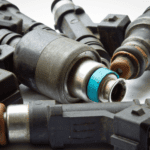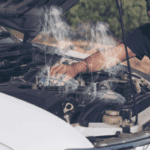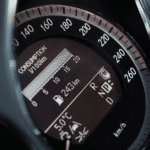A need to save money on ever-increasing fuel costs is not something new. One such area that can help is optimizing your vehicle’s gas mileage.
While various factors can influence a car’s fuel economy (more on these below), one often overlooked yet crucial part is the engine oil. Engine oil plays a vital role in the proper functioning of a car’s engine, impacting performance, longevity, and overall efficiency.
Understanding What Oil Does in the Engine
I always describe engine oil as similar to the blood flowing through our veins. Just like we wouldn’t last without blood, an engine will seize up and fail without engine oil lubricating and applying protective layers to moving mechanical components. With the temperatures engines run at, oil also provides overheating protection to the engine by dissipating absorbed heat.
All the properties and benefits oil gives an engine contribute to a smoother, cleaner, and more efficient running vehicle.
Can an Oil Change Improve Gas Mileage?
Yes, changing the oil can improve gas mileage. Vehicle and oil manufacturers spend vast amounts of money to make engines more fuel efficient, reducing emissions. Oil is one of the components that can have such an effect. By changing the oil, you can significantly boost the recovery of lost miles per gallon (MPG), as studies have shown. In fact, there are five main reasons why changing the oil will significantly improve your car’s gas mileage:
- Reduced friction – As oil ages, it becomes less effective at lubricating the moving metal components, leading to increased friction. Friction is bad for an engine as it means the running temperatures are raised, it no longer runs smoothly, and if it gets bad enough, the engine could misfire. Fresh oil has better lubrication properties, reducing friction between the engine components, which means less energy is required to keep the engine running smoothly.
- Engine cleanliness – Fresh oil contains detergents that help keep the engine clean by preventing deposits and sludge build-up. Cleaner engine components perform more efficiently. By draining the oil, you also remove contaminants from the old oil, promoting a smoother-running engine.
- Engine cooling – Oil also plays a role in dissipating heat generated by the engine. When the oil is old, it degrades, meaning it loses its ability to dissipate high heat temperatures effectively. A hotter running engine will mean it does not run at optimal temperature levels, so that you will notice an increase in fuel consumption. Changing the oil will immediately restore its ability to help keep temperatures under control.
- Oil viscosity – Restoring the viscosity of the engine oil is an essential factor in increasing fuel efficiency. Old engine oil degrades, and oxidation occurs, meaning it reacts with oxygen. If left in this state for long periods, engine oil can become extremely thick, like sludge. The engine will work much harder using more fuel to pump the more viscous oil around the motor.
- Preventing engine damage – The oil acts as a protective layer between engine parts, preventing metal-to-metal contact, which can result in damaged components. When the oil degrades, it will not provide adequate protection, and there will be a significant increase in the chances of bearings, bushes, and other moving components getting damaged. Depending on how significant the damage is, if the engine needs to work harder, it will use more fuel. Changing the oil will help improve the MPG. However, if significant engine damage has been done due to very old, degraded oil or running at extremely low levels for prolonged periods changing the oil will not help.
Other Problems That Can Cause a Decline in Mpg
Several other car parts, systems, and conditions can affect a vehicle’s fuel efficiency (mpg). Here are some common ones:
- Tire condition – Underinflated or worn-out tires create more rolling resistance, reducing fuel efficiency.
- Air filter – A clogged air filter restricts airflow to the engine, leading to inefficient fuel combustion.
- Spark plugs – Worn-out or fouled spark plugs can misfire, causing inefficient fuel burning and reduced mpg.
- Oxygen sensors – Faulty oxygen sensors can provide incorrect data to the engine control unit (ECU), leading to an imbalance of fuel-to-air ratios and higher fuel consumption.
- Fuel injectors – Dirty or malfunctioning fuel injectors can cause insufficient fuel delivery to the engine, resulting in poor fuel efficiency.
- Mass airflow sensor (MAF) – The MAF measures the air entering the engine, helping to adjust the fuel mixture accordingly. If the MAF malfunctions, it can negatively impact fuel consumption.
- Catalytic converter – A blocked or failing catalytic converter can reduce engine performance and fuel efficiency.
- Wheel alignment – Improper wheel alignment can cause increased rolling resistance and decreased fuel efficiency.
- Transmission issues – Problems with the transmission, such as slipping gears or inadequate fluid levels, can increase the load on the load on the engine.
- Brake Issues – Stuck calipers or dragging brakes can cause unnecessary friction, meaning the engine has to work harder.
- Exhaust system – A damaged or leaking exhaust system can reduce the necessary back pressure and affect air-fuel ratios used for combustion.
- Engine sensors – Almost every sensor on an engine can affect fuel efficiency. Most faulty sensors will cause the ECU to alter the fuel or air delivery for combustion in some way or another.
Tips for Improving Gas Mileage
Improving the fuel efficiency of a car is relatively straightforward stuff that involves a bit of common sense, keeping up with regular service, and carrying out proper monthly checks. Some of the things you can do below offer a very little increase in MPG individually, but you can get a noticeable boost when combined with another. Some of my tips for improving gas mileage are:
- Regular maintenance – Keeping up with regular maintenance, such as replacing air filters, fuel filters, engine oil, and spark plugs, ensures that the engine operates optimally and efficiently.
- Tire checks – Maintaining proper tire pressure and ensuring the tires are aligned and balanced can significantly impact fuel efficiency.
- Aerodynamics – Reduce aerodynamic drag by removing roof racks, spoilers, or anything that disturbs the airflow around the vehicle.
- Reduce weight – Avoid carrying unnecessary weight in your car, as extra weight requires more energy to move the vehicle.
- Smooth driving – Practicing smooth and steady driving, avoiding aggressive acceleration and heavy braking.
- Use a higher gear – Driving in higher gears at appropriate times can help maintain a consistent and efficient RPM range.
- Limit idling – Avoid unnecessary idling, as idling consumes fuel without moving the car.
- Use cruise control – On highways, cruise control can help maintain a constant speed, often improving fuel efficiency.
- Fuel: Ensure you’re using the recommended fuel for your vehicle. High-quality fuel can make a difference in efficiency.
- Plan efficient routes – Plan your trips to minimize distance and avoid traffic congestion.
- Avoid high speeds – Driving at high speeds increases air resistance and reduces fuel efficiency. Driving at a moderate and consistent speed can save fuel.
Conclusion
Fuel efficiency is just one of the things that can be improved by changing the oil. You can increase the MPG back to almost new car levels when carried out alongside some of the other monthly car maintenance checks. Changing the engine oil has many other benefits, including increased acceleration, which I recommend having a read of next.









